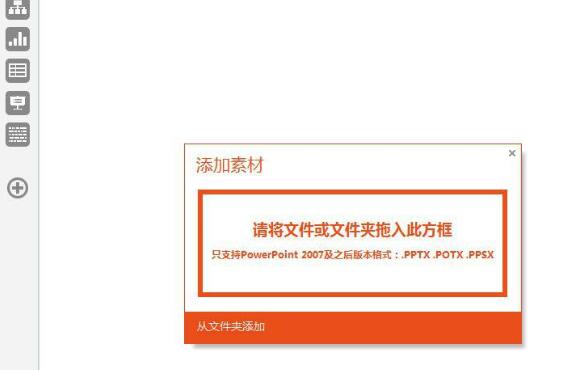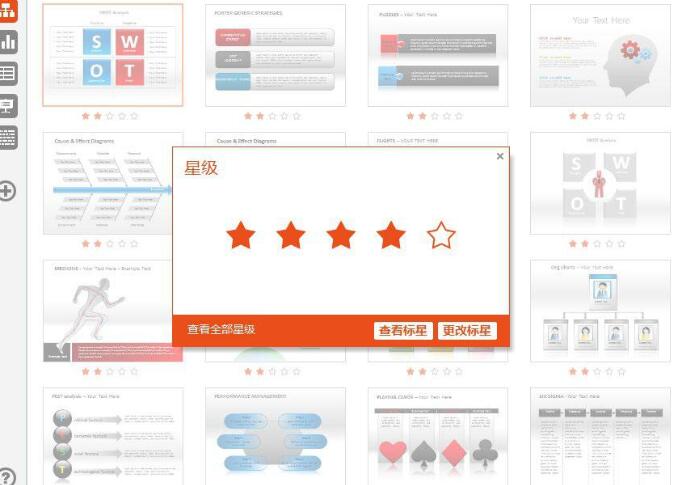How to use PPT material folder
The method of using the PPT material folder has always troubled many people. The operation is complicated and difficult to get started. PHP editor Xinyi has compiled a tutorial on the use of PPT material folders for everyone, from how to create and add materials to how to call and manage materials, so that everyone can easily master the use skills of PPT material folders. Below, we will introduce in detail how to use the PPT material folder to help you solve long-standing problems.
First step: Download and install the PPT material folder software first
Second step:
[Import] PPT materials for centralized management

Click the [ ] sign on the left side of the software to drag the selected PPT material into the orange box to complete the addition of the material.
Note: If the imported PPT material has been marked according to categories, you can directly enter the categories without having to classify and mark again.
Add [Classification Mark] to the PPT materials and conduct primary classification and sorting of the files

The PPT materials that appear under the [Pending Sorting] category are all unclassified Marked, simple classification marking is required for ease of use. The steps are:
1. Select the PPT material
2. Click the [Note Pin] icon in the upper right corner of the software. In the dialogue that appears Select the corresponding category in the box. After classification, you can view it under the corresponding main category
Add detailed [category tags] to the PPT materials and conduct advanced classification and organization of the files

After entering the main category, you can continue to mark the detailed categories. Take [Logic Illustration] as an example. The steps are as follows:
1. Select the PPT material
2. Click the [Notes] in the upper right corner of the software. Pin] icon, and in the dialog box that appears, select the categories of [Logical Relationship] [Expand Method] [Style Effect] [Spatial Expression] [Animation Add] again. After classification, you can view it under the corresponding main category
Use detailed [Category Mark] to quickly filter and view PPT materials

After entering the main category, you can classify and filter PPT materials. Take [Logic Illustration] as an example. The steps are as follows:
1, select the PPT material
2, click any option in the dialog box that appears to view the PPT material under the corresponding category
Add [tag] to the PPT material, Materials can be quickly located

After entering the main category, PPT materials can be quickly labeled. Taking [Logic Illustration] as an example, the steps are as follows:
1, select PPT Material
2, click the [Bookmark] icon in the upper right corner of the software, you can add or delete [Tag] to the selected PPT material in the dialog box that appears
Note: Do not select the PPT material Directly click the [Bookmark] icon in the upper right corner of the software to filter and select by [Tag]
Add [Star Rating] to sort commonly used PPT materials

All unprocessed The compiled PPT materials all have 0 stars. You can sort the PPT materials by weight by adding stars. The steps are as follows:
1. Select the PPT material
2. Click PPT Click the [Pentagonal Star] icon below the material to add or change the [Star Rating] to the selected PPT material in the dialog box that appears.
Note: Do not select the PPT material and directly click the [Pentagonal Star] icon below the PPT material. Star] icon can be filtered by [star rating] and selected
. The PPT materials that have been [categorized and marked] can be [exported] and shared with other users. The user can then import the [exported] PPT materials into the PPT material folder again. The software can automatically classify according to the original material classification status

The above is the detailed content of How to use PPT material folder. For more information, please follow other related articles on the PHP Chinese website!

Hot AI Tools

Undresser.AI Undress
AI-powered app for creating realistic nude photos

AI Clothes Remover
Online AI tool for removing clothes from photos.

Undress AI Tool
Undress images for free

Clothoff.io
AI clothes remover

AI Hentai Generator
Generate AI Hentai for free.

Hot Article

Hot Tools

Notepad++7.3.1
Easy-to-use and free code editor

SublimeText3 Chinese version
Chinese version, very easy to use

Zend Studio 13.0.1
Powerful PHP integrated development environment

Dreamweaver CS6
Visual web development tools

SublimeText3 Mac version
God-level code editing software (SublimeText3)

Hot Topics
 1378
1378
 52
52
 5 Things You Can Do in Excel for the Web Today That You Couldn't 12 Months Ago
Mar 22, 2025 am 03:03 AM
5 Things You Can Do in Excel for the Web Today That You Couldn't 12 Months Ago
Mar 22, 2025 am 03:03 AM
Excel web version features enhancements to improve efficiency! While Excel desktop version is more powerful, the web version has also been significantly improved over the past year. This article will focus on five key improvements: Easily insert rows and columns: In Excel web, just hover over the row or column header and click the " " sign that appears to insert a new row or column. There is no need to use the confusing right-click menu "insert" function anymore. This method is faster, and newly inserted rows or columns inherit the format of adjacent cells. Export as CSV files: Excel now supports exporting worksheets as CSV files for easy data transfer and compatibility with other software. Click "File" > "Export"
 How to Use LAMBDA in Excel to Create Your Own Functions
Mar 21, 2025 am 03:08 AM
How to Use LAMBDA in Excel to Create Your Own Functions
Mar 21, 2025 am 03:08 AM
Excel's LAMBDA Functions: An easy guide to creating custom functions Before Excel introduced the LAMBDA function, creating a custom function requires VBA or macro. Now, with LAMBDA, you can easily implement it using the familiar Excel syntax. This guide will guide you step by step how to use the LAMBDA function. It is recommended that you read the parts of this guide in order, first understand the grammar and simple examples, and then learn practical applications. The LAMBDA function is available for Microsoft 365 (Windows and Mac), Excel 2024 (Windows and Mac), and Excel for the web. E
 If You Don't Use Excel's Hidden Camera Tool, You're Missing a Trick
Mar 25, 2025 am 02:48 AM
If You Don't Use Excel's Hidden Camera Tool, You're Missing a Trick
Mar 25, 2025 am 02:48 AM
Quick Links Why Use the Camera Tool?
 How to Create a Timeline Filter in Excel
Apr 03, 2025 am 03:51 AM
How to Create a Timeline Filter in Excel
Apr 03, 2025 am 03:51 AM
In Excel, using the timeline filter can display data by time period more efficiently, which is more convenient than using the filter button. The Timeline is a dynamic filtering option that allows you to quickly display data for a single date, month, quarter, or year. Step 1: Convert data to pivot table First, convert the original Excel data into a pivot table. Select any cell in the data table (formatted or not) and click PivotTable on the Insert tab of the ribbon. Related: How to Create Pivot Tables in Microsoft Excel Don't be intimidated by the pivot table! We will teach you basic skills that you can master in minutes. Related Articles In the dialog box, make sure the entire data range is selected (
 Use the PERCENTOF Function to Simplify Percentage Calculations in Excel
Mar 27, 2025 am 03:03 AM
Use the PERCENTOF Function to Simplify Percentage Calculations in Excel
Mar 27, 2025 am 03:03 AM
Excel's PERCENTOF function: Easily calculate the proportion of data subsets Excel's PERCENTOF function can quickly calculate the proportion of data subsets in the entire data set, avoiding the hassle of creating complex formulas. PERCENTOF function syntax The PERCENTOF function has two parameters: =PERCENTOF(a,b) in: a (required) is a subset of data that forms part of the entire data set; b (required) is the entire dataset. In other words, the PERCENTOF function calculates the percentage of the subset a to the total dataset b. Calculate the proportion of individual values using PERCENTOF The easiest way to use the PERCENTOF function is to calculate the single
 You Need to Know What the Hash Sign Does in Excel Formulas
Apr 08, 2025 am 12:55 AM
You Need to Know What the Hash Sign Does in Excel Formulas
Apr 08, 2025 am 12:55 AM
Excel Overflow Range Operator (#) enables formulas to be automatically adjusted to accommodate changes in overflow range size. This feature is only available for Microsoft 365 Excel for Windows or Mac. Common functions such as UNIQUE, COUNTIF, and SORTBY can be used in conjunction with overflow range operators to generate dynamic sortable lists. The pound sign (#) in the Excel formula is also called the overflow range operator, which instructs the program to consider all results in the overflow range. Therefore, even if the overflow range increases or decreases, the formula containing # will automatically reflect this change. How to list and sort unique values in Microsoft Excel
 How to Format a Spilled Array in Excel
Apr 10, 2025 pm 12:01 PM
How to Format a Spilled Array in Excel
Apr 10, 2025 pm 12:01 PM
Use formula conditional formatting to handle overflow arrays in Excel Direct formatting of overflow arrays in Excel can cause problems, especially when the data shape or size changes. Formula-based conditional formatting rules allow automatic formatting to be adjusted when data parameters change. Adding a dollar sign ($) before a column reference applies a rule to all rows in the data. In Excel, you can apply direct formatting to the values or background of a cell to make the spreadsheet easier to read. However, when an Excel formula returns a set of values (called overflow arrays), applying direct formatting will cause problems if the size or shape of the data changes. Suppose you have this spreadsheet with overflow results from the PIVOTBY formula,





